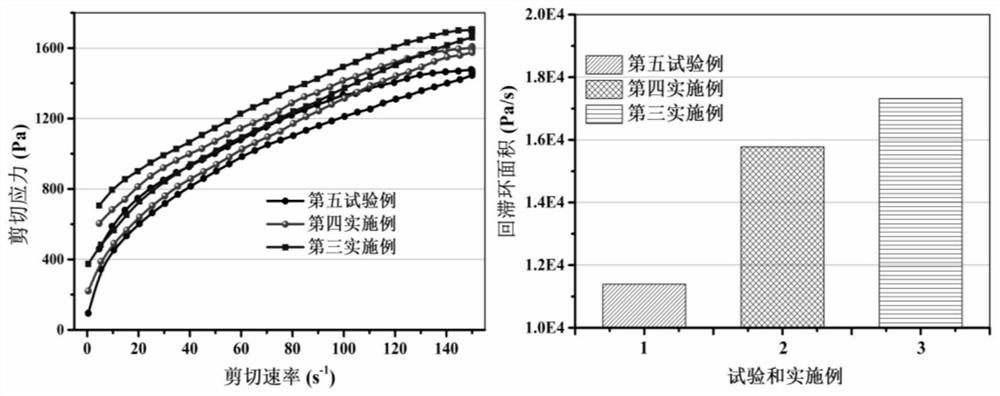A kind of highly thixotropic 3D printing cement-based material and its preparation method and application
A cement-based material, 3D printing technology, applied in chemical instruments and methods, carbon preparation/purification, additive processing, etc., can solve the problem of affecting mechanical properties, poor early mechanical properties, and poor matching between printing materials and extrusion devices To achieve the effect of improving mechanical properties, good thixotropy, and stable printing structure
- Summary
- Abstract
- Description
- Claims
- Application Information
AI Technical Summary
Problems solved by technology
Method used
Image
Examples
no. 1 example
[0046] 1. A method for preparing a porous biomass carbon material, comprising the steps of:
[0047] (1) Dry 500 grams of corn stalks in an oven for 12 hours at 60°C.
[0048] (2) Grinding the dried corn stalks in a grinder for 30 minutes to obtain straw debris, soaking the straw debris in 1M hydrochloric acid for 30 minutes, and then washing the straw debris with deionized water to remove residual hydrochloric acid, After washing, the straw chips were dried in an oven for 6 hours at a drying temperature of 60° C. to obtain pretreated straw chips.
[0049] (3) Mix the pretreated straw scraps obtained in step (2) with papermaking lime mud evenly at a mass ratio of 5:1, place them in a tube furnace, and then calcine them in a nitrogen atmosphere for 2 hours. The calcination temperature is controlled at 730±2 °C to obtain biomass porous carbon.
[0050] (4) Place the biomass carbon material obtained in step (3) in hydrofluoric acid with a mass concentration of 18%, heat it in a...
no. 2 example
[0056] 1. A method for preparing a porous biomass carbon material, comprising the steps of:
[0057] (1) Dry 500 grams of corn stalks in an oven for 14 hours at a drying temperature of 50°C.
[0058] (2) Grinding the dried corn stalks in a grinder for 28 minutes to obtain straw debris, soaking the straw debris in 1M hydrochloric acid for 25 minutes, and then washing the straw debris with deionized water to remove residual hydrochloric acid, After washing, the straw chips were dried in an oven for 7 hours at a drying temperature of 60° C. to obtain pretreated straw chips.
[0059] (3) Mix the pretreated straw scraps obtained in step (2) with papermaking lime mud evenly at a mass ratio of 5:1.2, place them in a tube furnace, and then calcine them in a nitrogen atmosphere for 1 hour. The calcination temperature is controlled at 800±2 °C to obtain porous carbon.
[0060] (4) Place the porous carbon obtained in step (3) in hydrofluoric acid with a mass concentration of 20%, heat ...
no. 3 example
[0066] 1. A method for preparing a porous biomass carbon material, comprising the steps of:
[0067] (1) Dry 500 grams of wheat straw in an oven for 8 hours at 65°C.
[0068] (2) Grinding the dried corn stalks in a grinder for 35 minutes to obtain straw debris, soaking the straw debris in 1M hydrochloric acid for 35 minutes, and then washing the straw debris with deionized water to remove residual hydrochloric acid, After washing, the straw chips were dried in an oven for 5 hours at a drying temperature of 70° C. to obtain pretreated straw chips.
[0069] (3) Mix the pretreated straw scraps obtained in step (2) with papermaking lime mud evenly at a mass ratio of 5:1.5, place them in a tube furnace, and then calcinate them in a nitrogen atmosphere for 2 hours. The calcining temperature is controlled at 750±2 °C to obtain porous carbon.
[0070] (4) Place the porous carbon obtained in step (3) in hydrofluoric acid with a mass concentration of 5%, heat it in a water bath for 35...
PUM
| Property | Measurement | Unit |
|---|---|---|
| particle size | aaaaa | aaaaa |
| water reduction rate | aaaaa | aaaaa |
Abstract
Description
Claims
Application Information
 Login to View More
Login to View More - R&D
- Intellectual Property
- Life Sciences
- Materials
- Tech Scout
- Unparalleled Data Quality
- Higher Quality Content
- 60% Fewer Hallucinations
Browse by: Latest US Patents, China's latest patents, Technical Efficacy Thesaurus, Application Domain, Technology Topic, Popular Technical Reports.
© 2025 PatSnap. All rights reserved.Legal|Privacy policy|Modern Slavery Act Transparency Statement|Sitemap|About US| Contact US: help@patsnap.com

